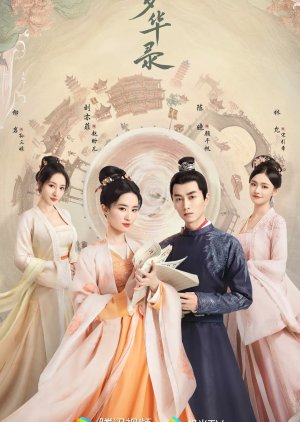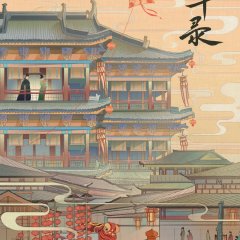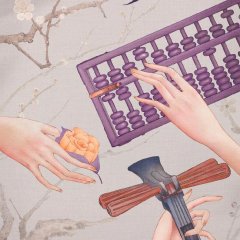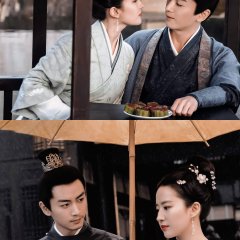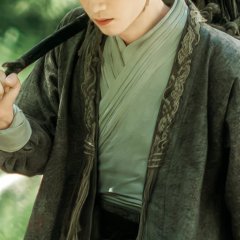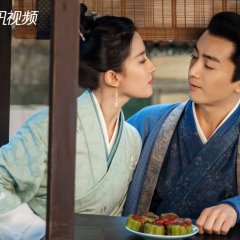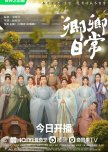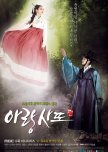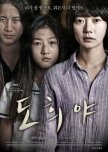 Most Popular Chinese Actresses on MDL Part 1
Most Popular Chinese Actresses on MDL Part 1 No início do século XI, o futuro do Império está em perigo depois que uma pintura comprometedora da vida passada da Imperatriz desaparece, ameaçando prejudicar a família imperial. Gu Qian Fan, o comandante de uma unidade militar de elite, é enviado para encontrar o quadro antes que ela caia em mãos erradas. Enquanto isso, Zhao Pan Er, uma jovem que está a procura de seu noivo desaparecido, também está na capital imperial em busca de respostas. Ela une forças com duas mulheres que salvou de situações desesperadoras: Song Yinzhang e Sun San Niang. Sun foi abandonada pelo marido e impedida de ver o filho, enquanto Song estava sendo abusada pelo marido mulherengo. As três mulheres abrem uma pequena casa de chá, que logo se torna o assunto da cidade, devido à diversidade culinária, chás e talentos musicais. Eventualmente, os caminhos de Zhao Pan Er e Gu Qian Fan se cruzam. Embora inicialmente desconfiem um do outro, eles percebem que um relacionamento mais próximo pode ser de benefício mútuo. O que acontecerá, no entanto, quando eles começarem a se envolver romanticamente? (Fonte: Viki) Editar Tradução
- Português (Portugal)
- Русский
- Español
- English
- Título original: 梦华录
- Também conhecido como: Bian Liang Meng Hua Tu , Um Sonho de Glória , A Dream of Splendor
- Diretor: Yang Yang
- Roteirista: Zhang Wei
- Gêneros: Histórico, Romance
Onde assistir Sonho de Esplendor
Elenco e Créditos
- Crystal Liu Papel Principal
- Chen Xiao Papel Principal
- Ada Liu Papel Principal
- Jelly Lin Papel Principal
- Gao Chang Yuan Papel Secundário
- Xu Hai Qiao Papel Secundário
Resenhas

Love is a many splendored thing.
A Dream of Splendor has rocked the staid, tired, cliché infested Chinese period drama world. It is an alluring adult romance that has set the internet on fire. It is a powerful and exhilarating story about downtrodden women who work together to stand up against feudal society. Written and directed by women, it is a story about how women survive, thrive, bond and love. The production values are astonishing, with meticulous attention to detail and appreciation for history and culture.This story is about the plight of fallen women or jian ji 贱籍 during Northern Song Dynasty. Jian ji are pariahs or outcasts; people who exist outside of the four social classes of scholars, farmers, workers and merchants and are practically slaves, beggars, prostitutes, actors, musicians or fallen people below commoner status. This status is passed from generation to generation and cannot be easily changed and the women are not considered suitable for marriage into gentry other than as concubines. Promising beauties like Zhao Pan'er and Song Yinzhang are trained from a young age in the fine arts and performance to potentially become renown entertainers to the imperial court. Too often, like Zhang Haohao they become courtesans who flourish at the most elite levels of society and are almost indistinguishable from upper class women. Many hope to marry their patrons and leave this existence behind them. This explains both Pan'er and Yinzhang's insecurities and their strong desire to shed the taint of the jian ji 贱籍 status.
The drama was mocked for its preoccupation with chastity which does not fit in with the societal norms of the day. In Guan Hanqing's famous original zaju 杂剧 or Yuan opera 赵盼儿风月救风尘 (Zhao Pan'er Flirts to Save A Harlot), both Panér and Yinzhang are courtesans. Guan Hanqing's works are known for championing the oppressed and courtesans were historically viewed sympathetically. The grace, beauty and education of legendary courtesans is often celebrated in Chinese vernacular literature. The production decided however, that Chinese audiences would not be receptive to a Song dynasty version of Pretty Woman. While some may feel this does not respect the original works, it is not important. The drama adaptation in its entirety is far from prudish and remains faithful to the spirit of the play in its criticism of the hypocrisy of traditional morality. That is all that really matters.
After crushing personal setbacks, Zhao Pan'er, Sun Sanniang and Song Yinzhang make a fresh start in the capital Kaifeng. They are bonded by the hardships they endure due to their low social status. They are realistic characters with flaws aplenty who make mistakes with consequences. They don't always agree and when they fight, they can be woman style mean to each other. Pan'er is a talented performer and a connoisseur of tea, tea art and famous paintings. Despite her serene demeanor, she has her own insecurities but is determined to leave her painful past to become an independent and capable business woman. She won't be bullied, is vengeful and does not hesitate to seek legal redress for injustices.
Pan'er is overprotective of the immature and temperamental Yinzhang, a rare and talented pipa player whose ability is only exceeded by her arrogance and desperation to escape her low status. Together with the feisty and loyal Sanniang, a fantastic cook and pastry chef, the three friends start a teahouse with their pooled resources and combined abilities. On the way to Kaifeng, Pan'er clashes with the Living Devil Gu Qianfan, commander of the powerful and secretive Capital Security Office and all kinds of sparks fly. Liu Yifei and Chen Xiao are the stars of the show with their thrilling, combustive chemistry and screen presence. Both actors have matured considerably and it is fair to say Zhao Pan'er and Gu Qianfan are their best roles to date respectively. Even though Yinzhang is the character that shows the most growth, Lin Yun's portrayal lacks complexity and is not empathetic. It is the weakest link among the main cast. Liu Yan's Sanniang saves the day as the best friend everyone needs with her wonderful mixture of comedic belligerence, endurance and wisdom.
This drama's greatest attraction and also its greatest drawback is the incomparable romance between Zhao Panér and Gu Qianfan. The fervent, ardent chemistry between Liu Yifei and Chen Xiao has me grinning like a giddy, lovesick fool every time they light up the screen. I love how Chen Xiao communicates passion with heat in his eyes and how his expression can suddenly turn from guarded to vulnerable to hopelessly smitten. I leapt up from my sofa and yelled "liar, LIAR" at him in the very first episode when Gu Qianfan claimed not to find Panér beautiful even as his eyes oozed with pure male appreciation. Liu Yifei's Panér is such an exquisite and feminine foil for his masculinity that it is just entrancing to watch their courtship as it evolves subtly from friction to unwelcome attraction as she slowly beguiles him with her grace, independence and soft-spoken sincerity. Yang Yang is a phenomenal director whose gorgeous and intimate camera angles enhances the thrill of their budding romance and build up in passion to the point there are moments I feel like I am invading their privacy. The drawback of course is that the story is much bigger than the love story which is too engrossing and spectacular. All the other plot threads pale in comparison.
At the point I am in serious danger of diabetes from the sugar highs, Pan'er's and Qianfan's romance gets put on ice for a number of episodes for a flimsily crafted misunderstanding. I am less dismayed than most by it, because I like to see a relationship tested for duration by challenges. While their conflict could be better conceived, the writer has fewer degrees of freedom to work with because the plot is embedded within true events and historical figures of the day. This won the praise of many history buffs who got a huge kick out of deciphering who's who and which events, as was analyzed in detail by other viewers such as @CloudA. Panér's heartbroken but enlightened insight that her father fully knew well the consequences of his actions but chose to do so anyway is a resonating fresh twist out of a tired trope. Despite their hiccup, the couple remains honest with each other about their fears and have realistic expectations that it may not be smooth sailing all the way. Du Changfeng and Sanniang's story is charming and heart warming while Chen Lian and Zhaodi's is more youthful and high spirited. I have high hopes that both Yinzhang and Chi Pan will find happiness down the road.
The digression from the main romance plot makes way for the women's story to be properly told, for their bond to mature and for them rescue each other and themselves; to be mistresses of their own destiny. The debut of their fabulous Yong'an Restaurant showcases their combined business sense, artistry and ability to innovate and is for me is the highlight of the drama. Pan'er's riveting tea art performance at the beginning is eclipsed by the extravagant and absolutely decadent dinner performance where famous paintings came vividly to life. I love how spectacularly it involves most of the supporting cast. Both the cheeky He Si and Chi Pan made me laugh and the women looked stunning. It is analogous to how this production breathes life into the famous historical works of art and literature that inspired this story.
For me, the comedy mostly misses the mark. I find Guan Yunping's (Chen Lian) more subtly hilarious brand of humor more appealing than Dai Xu's (Chi Pan) more slapstick and exaggerated approach. The actor tones it down nicely in the second half and manages make me laugh and impresses me with his acting but unfortunately that is where the plot loses momentum. This is somewhat forgivable since it is more of a character story but nonetheless they should have kept things simpler. The political aspects of the conspiracy to disgrace the empress becomes overly convoluted and leaves loose threads. Even though Ouyang Xu's final confrontation with Pan'er is well acted and satisfying, he becomes the embodiment of too many bad men and love to hate stereotypes. The interpretation of Empress Liu-E, a brilliant and powerful historical figure as a woman pushed to try to conceal her humble origins is fascinating and aligns well with the dramas feminist theme. It is well known the Emperor was aware of her background and did not care. Theirs was surely another splendid love story for the ages.
Pan'er and Qianfan's addictive chemistry and their story convinces that love is a many splendored thing. They are certainly bound for the Drama Couple Hall of Fame. Despite the disappointment in plot, which is at best worth an 8.5, I am compelled to rate this a 9.0 for the romance and for getting the important things right including the empowering themes, the originality and the director's magnificent and distinctive visual composition style.

Artistic, Beautiful, Classy, Elegant, Humorous, Sweet Romance, Mysterious
A Dream of Splendor is an adaptation of a very beloved classic story written by a playwright in the Yuan Dyansty (c. 1271–1368). The original story, titled 赵盼儿风月救风尘, in short “Saving the Courtesan” (救风尘), tells the story of Yinzhang marrying a man who forced her into prostitution. Zhao Pan'er came to help her by seducing the man into signing the divorce paper. Yinzhang later married the upstanding scholar who Zhao Pan’er was in love with. The story was so inspiring that over the years, it has been adapted into movie, TV series, dramas, plays, Chinese operas (越剧), and even into a comic book (manhua). In A Dream of Splendor, romance and politics are added to give it a complete flavor for today’s audience.Though fictional names are used, this drama is said to have set in the Song Dynasty, around c. 1019, during Emperor Zhenzong’s reign. The Emperor was sickly and his Empress, Liu E assisted him in the ruling, handling various state matters. Having a less than pristine family background, court officials had divided opinions of the Emperor taking Liu E as the Empress. In this fictional story, the Empress was an entertainer in the past, and her image was captured in a painting as she was entertaining her host and guests. As a Secret Service for the Imperial Palace, Gu Qianfan (Chen Xiao) is ordered to retrieve the painting before it’s fallen into the hands of those who want to use it to expose the Empress of her past.
While searching for that painting, Gu Qianfan crosses path with Zhao Pan’er (Liu Yifei). After saving Gu Qianfan when he is almost killed, Zhao Pan’er comes to the capital city in search of her fiancé, Ouyang Xu (Xu Haiqiao), together with her best friends, Song Yinzhang (Lin Yun aka Jelly Lin) and Sun San Niang (Liu Yan aka Ada Liu). Each of them has had gone through the worst of their lives: Sun San Niang is jilted by her husband and denied by her son and she attempts suicide, while Song Yinzhang is abused by her gigolo husband. Zhao Pan’er has rescued both women while going through a breakup with a relationship for three years. The trio decides they need to maintain their dignity, depend on themselves and will not be subjected to the manipulation of any men. They first start a small and elegant tea house, and later run the most talked-about restaurant in town, employing the skills each possesses – Zhao Pan’er’s art of tea, Song Yizhang’s talent of the pipa instrument and Sun San Niang’s outstanding gourmet cooking.
Zhao Pan’er has a modern-day business acumen. She turns her adversaries into her allies. She is good in putting two and two together to figure things out. She is artistic, intelligent, and fast witted. In this drama, she ends with the best love of her life whom she deserves. Liu Yifei’s acting is natural and amazing. Her charisma exudes elegance, beauty, grace and calmness.
Gu Qianfan is a ruthless, intelligent head of the Imperial Guard, and he can fight very well. Chen Xiao’s portrayal is convincing and natural, and most of all, he has an undeniable amazing chemistry with Liu Yifei. Their dynamics are over the top, and their romance is sweet and real.
Other cast members are just as good and convincing. Here we have a comedic character, Chi Yanei (Dai Xu), to light up the mood and add colors to the story. There’s a lot of growth with the main characters, in particular with Song Yinzhang who grows from a naïve gullible girl to an intelligent decisive business owner.
My Verdict
As lovely as the romance in this drama, this story is about courageous women helping and saving each other from their most egregious times and conditions. It is heart wrenching and anguish to watch the reality of life for ancient women and such trend is still persisting in today’s world that women are still being treated harshly and unfairly, in particular in light of the recent abortion ban in the USA.
The 2001 version of the drama starred Le Jiatong as Zhao Pan’er and Fan Bingbing as Yinzhang. In this earlier version, there were no Gu Qianfan nor Sun San Niang. The two female characters were flamboyant and very strong since the beginning, especially Yinzhang. Their costumes were colorful and tawdry as they were dancers. The music and dances were some of the most beautiful scenes to watch and are commendable.
In A Dream of Splendor, the Ouyang Xu character is being vilified (vis a vis the scholar that was loved by both women in the earlier version), and the women’s characters are subdued and more dignify, giving them more class and elegance; Zhao Pan’er’s expertise in the art of tea and Song Yinzhang’s brilliance in playing the pipa instrument. Any viewers will be mesmerized by the beauty and elegance of these ladies when they execute their exquisite art forms. I like the way the characters talk, softly, and directly without beating around the bush nor losing grace, and without fear nor hypocrisy. The drama explores the main five senses of our bodies with some more in-depth than others: visual, sound, taste, touch, smell. Though the story and plot are not perfect with a lot of unplugged holes, the romance is warm and desirable, the aesthetic value is one of the best (Zhao Pan'er's art of tea, her dancing, visual of Yinzhang's pipa playing etc), and the instrumental music and OSTs are excellent.
Overall, this is a very enjoyable drama for all romance buffs and for viewers who appreciate the beautiful things in life. Don’t miss it. BRAVO!

